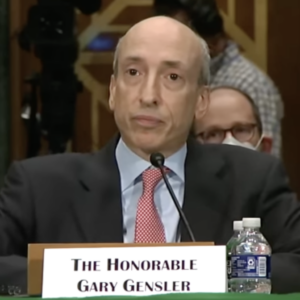Securities and Exchange Commission (SEC) chair Gary Gensler, who once claimed he got a thrill from cleaning up crises, faces one he might not be able to fix: his reputation among politicians, investors, and within the agency he oversees.
Critics say Gensler’s troubles stem from his overzealous efforts to impose regulatory action against emerging financial technology (fintech). That crusade has led to a series of sometimes embarrassing court losses.
“[He’s] a political liability in the United States,” Ripple CEO Brad Garlinghouse told CNBC. Ripple and Garlinghouse won a key victory last summer over the sale of the company’s XRP token. A federal judge said token sales weren’t considered securities, then denied Gensler’s appeal.
The Ripple loss was just the first disastrous domino to fall.
A separate panel of federal judges said Gensler and the SEC were capricious and inconsistent by not explaining why they denied Grayscale’s proposed Bitcoin exchange-traded program after previously approving two others.
But the biggest blow came in December when U.S. District Judge Robert Shelby threatened to sanction SEC attorneys for making “materially false and misleading representations” in a lawsuit against Wyoming-based crypto company DEBT BOX. They included a lie claiming that DEBT BOX wanted to move assets out of the country to avoid regulatory scrutiny.
The SEC eventually dropped the case.
Both Republicans and Democrats on Capitol Hill seem fed up.
“Gary Gensler is a politician masquerading as a regulator,” Rep. Ritchie Torres (D-N.Y.) told Fortune. Torres previously criticized Gensler’s heavy-handedness of crypto.
Rep. Warren Davison (R-Ohio) wants Gensler fired. “U.S. capital markets must be protected from a tyrannical chairman, including the current one,” he said while introducing the SEC Stabilization Act that removes Gensler.
A group of GOP senators led by Sen. J.D. Vance (R-Ohio) sent a letter to Gensler earlier this month expressing their concerns about the actions of Gensler’s agency.
“The public must have well-placed confidence in the commission’s enforcement actions, its motives for undertaking them, and its professionalism when carrying them out,” the senators wrote. “This trust is undermined, and your mission compromised, by episodes like the DEBT Box case.”
The reputational damage is putting a damper on Gensler’s future ambitions. An open secret in Washington is that he wants to become secretary of the treasury.
Fintech analysts aren’t surprised by congressional ire towards Gensler.
“I think that Chairman Gensler and Elizabeth Warren and others who’ve lined up against crypto are on the wrong side of history,” Jim Harper with the American Enterprise Institute told DCJournal. “There are people in the human rights community that are strong advocates of cryptocurrency because of the ability to give people power over their money in situations where they don’t have it.”
Dr. Jimmie Lenz, executive director of the Master of Engineering in FinTech at Duke University, said he believes the agency has lost its way.
He told DCJournal that Gensler’s SEC looks towards Europe’s “overbearing regulatory environment” for inspiration that prevents innovation. “They’ve hampered themselves so much on trying to protect people that they’ve kind of protected them to death.”
That isn’t stopping Gensler from pursuing his strong regulatory agenda. He pushed through new so-called “dealer” rules on Feb. 6, requiring more firms to register with the SEC and follow securities laws. Fintech and crypto-supporting groups called the rules “unworkable.”
Wall Street investors accused Gensler of doing irreparable harm to the SEC’s reputation during his reign as chair.
Ram Ahluwalia, CEO and co-founder of Lumida Wealth, posted on social media that Gensler’s strategies “inadvertently weakened” the agency’s legal and enforcement frameworks. Because of Gensler’s court failures, “a new SEC Chair and congressional action seems inevitable,” wrote Ahluwalia.
SEC staff want out. The agency’s crypto assets and cyber unit may soon see a “major exodus” of attorneys. It’s the second time since 2022 that top crypto leaders have left the SEC. Gensler’s management style and agenda were blamed for the bloodletting.
Garlinghouse isn’t sure why Gensler seems hellbent on crypto industry regulation. “He’s not acting in the interests of the citizenry; he’s not acting in the interests of the long-term growth of the economy, and I don’t understand it.”
Harper hopes a reckoning is in Gensler’s future based on the outrage of his current performance.
“It’s heartening to see that the tide is clearly against Gensler’s SEC, which is losing cases or sort of recognizing the writing on the wall in legal cases that are challenging what it’s doing.”


